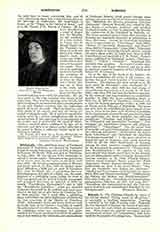

Schoningh.—The publishing house of Ferdinand Schoningh at Paderborn was founded by Ferdinand Friedrich Joseph Schoningh, who was born at Meppen in Hanover March 16, 1815, and died at Paderborn, August 18, 1883. He was the son of Dr. Schoningh, an official of the law courts. Educated at the gymnasium of his native town, he was active in the book trade since 1831. He served an apprenticeship in Munster and Svest, and on May 12, 1847, he opened under great difficulties a book and art store at Paderborn that soon developed into a prosperous business. Schoningh never lost sight of a higher aim, the establishment of a publishing house; selling his store in 1875 and perceiving the need of Catholic newspapers and periodical literature, he founded in 1848 the weekly “Westfalisches Kirchenblatt”, and in 1849 the “Westfalische Volksblatt”, which was intended to instruct the people in the political and social questions of the day and to give them the Christian view on these subjects. On April 1, 1910, a publishing house was formed, the initial publication of which was the first yearbook of the Diocese of Paderborn (1849). Schoningh’s ability and power for hard work gradually built up his business, especially as regards the publication of scientific works. The reputation of the publishing house was established and maintained in the literary and learned world by the publication of such works as the textbooks and exercise books of Ferdinand Schultz, which passed through many editions and were translated into numerous languages; the “Bibliothek der altesten deutschen Literatur-Denkmaler” (Helfand, Beowulf, etc.), edited by Moritz Heyne, a university professor; and excellent theological works, as that on dogmatics by Oswald, the explanation of the Catechism by Deharbe, etc. The house remained loyal to these three branches of learning and constantly increased its publications in these directions. Among the periodicals published under its supervision are: “Chrysologus” (from 1860); “Blotter fur kirchliche Wissenschaft and Praxis” (from 1867); “Gymnasium” (from 1883). Schoningh also did much to encourage Catholic poetry; among the poets whose works he issued were those of Brill, Luise Hensel, and especially of F. W. Weber. Weber’s poems published by Schoningh include: “Dreizehnlinden”, “Goliath”, “Gedichte”. Schoningh died suddenly from apoplexy. His stanch Catholic opinions, sincere and honest character, and joy in what he produced cannot be forgotten in the Catholic intellectual life of Germany.
Up to the time of the death of the founder, the house had published 673 works in 935 volumes, embracing the most varied branches of knowledge and literature. The business has been carried on in the same spirit by Schoningh’s sons, Ferdinand (b. March 7, 1856), who since 1885 has had charge of the publishing department, and Joseph (b. June 12, 1860), who since 1891 has been the business manager. In the course of time four branches were established, namely: in 1885 the Nasse publishing house at Munster; in 1887 one at Osnabruck, combined with a store for learned antiquarian works; in 1891 one at Mainz; and in 1902 one at Würzburg. The house has ever since its establishment given special attention to works in the three main divisions of learning. In the departments of scientific and practical theology and philosophy the house publishes the following periodicals: “Theologie and Glaube”; “Jahrbuch fur Philosophie and spekulative Theologie”; “Forschungen zur christlichen Literatur and Dogmengeschichte”; “Chrysologus”. For the entire field of scientific and practical pedagogics the house issued the following periodicals: “Monatschrift fur katholische Lehrerinnen” and “Zeitschrift fur christliche Erziehungswissenschaft”; it also gives attention to linguistics and to literature, and issued numerous works in all the other departments of learning. Among the more extensive compilations published by the firm should be mentioned the “Wissenschaftliche Handbibliothek”; 41 volumes of this work have already been issued, and of these 34 are theological and philosophical works written by distinguished German scholars, as B. Funk (Church history), Gopfert (moral theology), Heiner (canon law), Pohle (dogmatics), Pruner (pastoral theology), etc. Other publications are those of the Gorres Society: “Studien zur Geschichte and Kultur des Altertums”, “Quellen and Forschungen zur Geschichte der papstlichen Hof- and Finanzverwaltung”, “Publikationen der Sektion fur Rechts- and Sozialwissenschaft”. Still other works are: “Sammlung der bedeutendsten padagogischen Schriften aus alter and neuer Zeit”, “Sammlung der kommentierten and der Textausgaben deutscher and auslandischer Klassiker fur den Schulgebrauch”.
HERMANN MULLER

